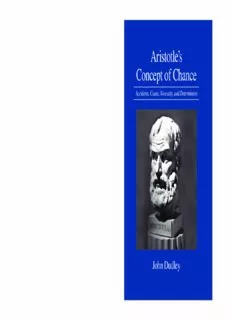
Aristotle’s Concept of Chance: Accidents, Cause, Necessity, and Determinism PDF
Preview Aristotle’s Concept of Chance: Accidents, Cause, Necessity, and Determinism
Aristotle’s pHILosopHy D u This landmark book is the first to provide a d l e comprehensive account of Aristotle’s concept y Concept of Chance of chance. Chance is invoked by many to explain the order in the universe, the origins of life, and human freedom and happiness. An understanding of Aristotle’s concept of chance is indispensable for Accidents, Cause, Necessity, and Determinism an appreciation of his views on nature and ethics, views that have had a tremendous influence on the development of Western A philosophy. Author John Dudley analyzes Aristotle’s account of chance in the Physics, the Metaphysics, in his biological and ethical treatises, as well r i as in his other works. Important complementary considerations such as s Aristotle’s criticism of pre-Socratic philosophers, particularly Empedocles t o and Democritus; Plato’s concept of chance; the chronology of Aristotle’s t l works; and the relevance of Aristotle’s thought to evolution and quantum e theory are also covered in depth. This is an essential book for scholars and ’ s students of Western philosophy. C o n c e p t o f C h John DuDley is Research Fellow in the De Wulf-Mansion a Centre for Ancient, Mediaeval and Renaissance Philosophy at the n university of leuven, Belgium. c e A volume in the SUNY series in Ancient Greek Philosophy Anthony Preus, editor SUNY P R E S S new york press John Dudley dudley HC new spine.indd 1 1/22/12 8:26:32 AM ARISTOTLE’S CONCEPT OF CHANCE Aristotle’s Concept of Chance Accidents, Cause, Necessity, and Determinism JOHN DUDLEY SUNY P R E S S Photo of the author: thanks to the Department of Journalism and Mass Communications, Benedictine College, KS Author’s address: John Dudley, Vlamingenstr. 75, 3000 Leuven, Belgium. Email: [email protected] Published by State University of New York Press, Albany © 2012 State University of New York All rights reserved Printed in the United States of America No part of this book may be used or reproduced in any manner whatsoever without written permission. No part of this book may be stored in a retrieval system or transmitted in any form or by any means including electronic, electrostatic, magnetic tape, mechanical, photocopying, recording, or otherwise without the prior permission in writing of the publisher. For information, address State University of New York Press, Albany, NY www.sunypress.edu Production by Diane Ganeles Marketing by Anne M. Valentine Library of Congress Cataloging-in-Publication Data Dudley, John, 1951– Aristotle’s concept of chance : accidents, cause, necessity, and determinism / John Dudley. p. cm. — (SUNY series in ancient Greek philosophy) Includes bibliographical references and index. ISBN 978-1-4384-3227-4 (hardcover : alk. paper) 1. Aristotle. 2. Chance. 3. Probabilities. 4. Necessity (Philosophy) 5. Free will and determinism. I. Title. B485.D73 2010 123'.3092—dc22 2010004944 10 9 8 7 6 5 4 3 2 1 For Marcella, Anthony and Timothy To be or not to be: that is the question: Whether ’tis nobler in the mind to suffer The slings and arrows of outrageous fortune, Or to take arms against a sea of troubles, And by opposing end them? – Shakespeare, Hamlet III, i, 56-60 If Chance will have me king, why, Chance may crown me, Without my stir. – Shakespeare, Macbeth, I, iv, 144-5 Rendons au hasard ce qui est au hasard et à Dieu ce qui est à Dieu... Ce que nous admirons par-dessus tout dans une rencontre du genre de celle de Waterloo, c’est la prodigieuse habilité du hasard. – Victor Hugo, Les Misérables, IIe partie, Livre I, XVI Chance has an empire which reduces choice to a fool’s illusion. – George Eliot, Middlemarch, Book VII, Ch. 64 One’s happiness must in some measure be always at the mercy of chance. – Jane Austen, Sense and Sensibility, Vol. II, Ch. 36 Multum cum in omnibus rebus tum in re militari potest fortuna. – Julius Caesar, De Bello Gallico VI, xxx, 2
Description: